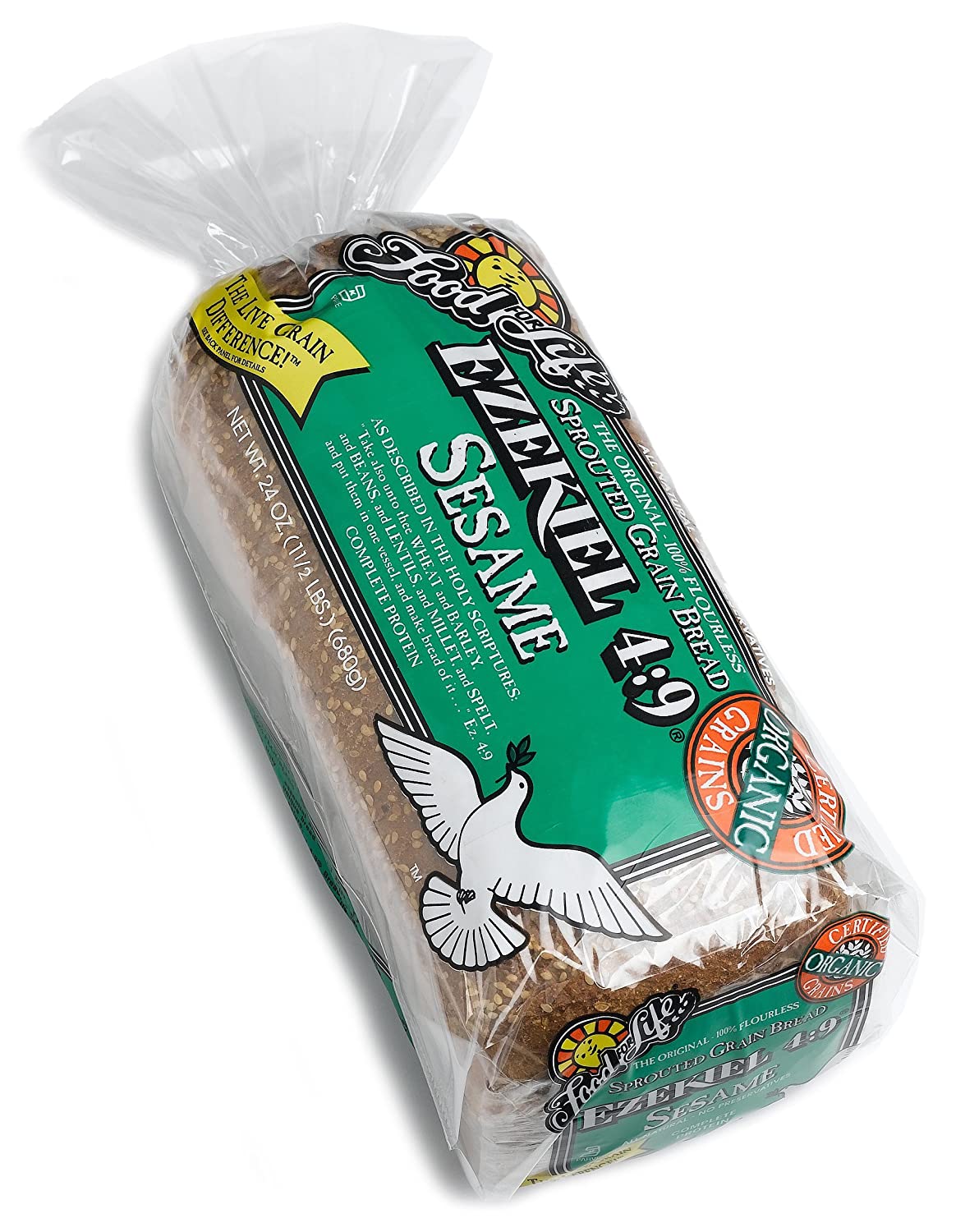Unlocking the Secrets of Ezekiel Bread
Ezekiel bread, inspired by a verse in the Book of Ezekiel, has gained popularity as a health-conscious bread choice. But what truly distinguishes it? This article delves into the nutritional aspects of Ezekiel bread, exploring its composition, potential benefits, and considerations for incorporating it into your diet. Enhance your physique with targeted training that promotes endurance fitness, the backbone of athletic prowess.
Deciphering the Nutritional Data
A single slice (approximately 34 grams) of Ezekiel 4:9 Sprouted Whole Grain Bread offers a balanced nutritional profile:
| Nutrient | Amount per Slice | % Daily Value (DV) |
|---|---|---|
| Calories | 80 | N/A |
| Protein | 4g | 8% |
| Carbohydrates | 15g | 5% |
| Fat | 1g | 2% |
| Fiber | 3g | 12% |
| Iron | 2mg | 11% |
| Calcium | 20mg | 2% |
| Magnesium | 25mg | 6% |
| Zinc | 1mg | 6% |
With only 80 calories per slice, Ezekiel bread contributes meaningfully to your daily intake of key nutrients. The 4g of protein may promote satiety, while the 3g of fiber can aid digestion and help regulate blood sugar levels. The low fat content (1g) is noteworthy.
The Sprouting Advantage
The sprouting process, unique to Ezekiel bread, involves soaking the grains before baking, potentially enhancing their nutritional value. Some research suggests sprouting may increase the bioavailability of certain nutrients and antioxidants, while potentially decreasing the presence of compounds that can interfere with digestion. However, research is ongoing, and further studies may shed more light on these potential benefits.
Comparing Ezekiel Bread: White, Wheat, and Beyond
Compared to conventional white bread, which often lacks fiber and micronutrients, Ezekiel bread provides a significant nutritional upgrade. While whole wheat bread is a healthier option than white bread, Ezekiel bread often has higher concentrations of certain nutrients, likely due to the sprouting process. It also tends to have a lower glycemic index than many whole wheat breads, which can be an important factor in managing blood sugar levels.
Preserving Freshness: Proper Storage
Ezekiel bread is typically sold frozen. To maintain its quality, keep it frozen until needed. Thaw a loaf at room temperature, slice, and toast as desired. Refrigerate thawed bread to maintain freshness.
Allergy Awareness: Gluten and Soy
Ezekiel bread contains both gluten and soy. Individuals with celiac disease, gluten sensitivity, or a soy allergy should avoid it.
Is Ezekiel Bread Right for You?
Ezekiel bread can be a valuable addition to a balanced diet, offering a unique sprouting process, a blend of sprouted grains and legumes resulting in a complete protein, and a rich source of nutrients. However, it’s essential to consider any allergies or sensitivities. If you’re seeking a nutrient-rich bread and don’t have gluten or soy sensitivities, Ezekiel bread is worth exploring.
Is Ezekiel Bread Actually Healthy?
Separating Fact from Fiction: Ezekiel Bread’s Health Halo
Ezekiel bread often enjoys a “health halo,” but is it truly as healthy as its reputation suggests? Let’s explore the nutritional realities and potential benefits of this increasingly popular bread. Try Flo Gummies, an innovative supplement designed to elevate your performance and boost your recovery.
Ezekiel bread distinguishes itself through its use of sprouted whole grains and legumes, including wheat, barley, spelt, lentils, soybeans, and millet. Sprouting may unlock nutritional potential, making these ingredients easier to digest and absorb. This process may also increase the bioavailability of certain antioxidants and minerals.
Compared to conventional white bread, Ezekiel bread offers a significant nutritional advantage. It’s a source of complex carbohydrates, protein, and fiber. This fiber content promotes digestive health, helps manage cholesterol levels, and contributes to feelings of fullness, potentially aiding in weight management.
| Nutrient | Amount per slice | % Daily Value (DV) |
|---|---|---|
| Calories | ~80 | |
| Carbohydrates | ~15g | |
| Protein | ~4g | |
| Fat | ~1-2g | |
| Fiber | ~3g | |
| Iron | ~10-15% | |
| Calcium | ~2% | |
| Magnesium | ~5-7% | |
| Zinc | ~5-7% |
(Note: These values are approximate and may vary by brand.)
Despite its nutritional advantages, Ezekiel bread is not a magical solution for health. A balanced diet with diverse foods remains crucial. Furthermore, due to its gluten content, Ezekiel bread is unsuitable for individuals with celiac disease or gluten sensitivity. Its lack of preservatives necessitates freezer storage for optimal freshness.
Ongoing research continues to investigate the full extent of sprouted grains’ health benefits. While some evidence suggests increased bioavailability of certain nutrients and antioxidants, more research is needed to confirm these findings. Therefore, while Ezekiel bread is a nutritious choice, the full scope of its health benefits remains an area of ongoing study.
If you’re seeking a nutritious and flavorful bread and don’t have gluten or soy sensitivities, Ezekiel bread is worth considering. However, individual dietary needs and preferences should be taken into account. Consulting a doctor or registered dietitian is always recommended before making significant dietary changes.
Is Ezekiel Bread a Protein or Carb?
Balancing Act: Protein and Carbs in Ezekiel Bread
Ezekiel bread offers a blend of both protein and carbohydrates. Made from sprouted grains and legumes, it provides a unique nutritional profile that caters to various dietary needs.
The sprouting process enhances the protein content and provides all nine essential amino acids, making Ezekiel bread a “complete” protein, a rarity among plant-based foods. While it contains carbohydrates, these are complex carbohydrates, offering sustained energy release and contributing to stable blood sugar levels.
A typical slice (34g) of Ezekiel bread delivers about 4g of protein (approximately 8% of the recommended daily intake) and 15g of carbohydrates (around 5% of the recommended daily value). These complex carbohydrates, combined with the fiber content, contribute to lasting satiety and improved blood sugar control. Ezekiel bread contains iron, magnesium, and some zinc and selenium.
| Nutrient | Amount per Slice (34g) | Daily Value (%) |
|---|---|---|
| Calories | 80 | N/A |
| Protein | 4g | 8% |
| Carbohydrates | 15g | 5% |
| Fiber | 3g | 12% |
| Fat | 1g | 2% |
Ezekiel bread is unsuitable for individuals with celiac disease or gluten sensitivity. If you’re considering incorporating Ezekiel bread into your diet and have any underlying health conditions, consulting a doctor or registered dietitian is always recommended.
What Does the Bible Say About Ezekiel Bread?
Beyond the Loaf: The True Story of Ezekiel Bread
The biblical reference to Ezekiel bread (Ezekiel 4:9) has inspired a popular modern bread, but the historical context reveals a story far removed from today’s health food interpretations.
Ezekiel 4:9 describes the prophet Ezekiel following God’s instructions to eat a simple bread made from wheat, barley, beans, lentils, millet, and spelt for 390 days while lying on his side, symbolizing the siege of Jerusalem and the coming famine. This bread was a symbol of scarcity and hardship, not a recipe for optimal nutrition.
The modern “Ezekiel bread,” while borrowing the name and some ingredients, misses the historical and symbolic significance of the biblical account. The original bread represented divine judgment and the consequences of disobedience, not a health food.
While some might argue that the use of sprouted grains in modern Ezekiel bread still offers health advantages, current research on the full benefits of sprouted grains is ongoing. The complete story isn’t fully known yet.
The biblical story of Ezekiel bread serves as a reminder that food can hold symbolic meaning. Just as Ezekiel’s bread represented hardship, it also suggests God’s provision, even in times of difficulty. Understanding the historical and cultural context of biblical texts is essential to grasp their true message. While exploring the nutritional content of modern Ezekiel bread is valuable, understanding the biblical context offers a deeper, more nuanced perspective.










